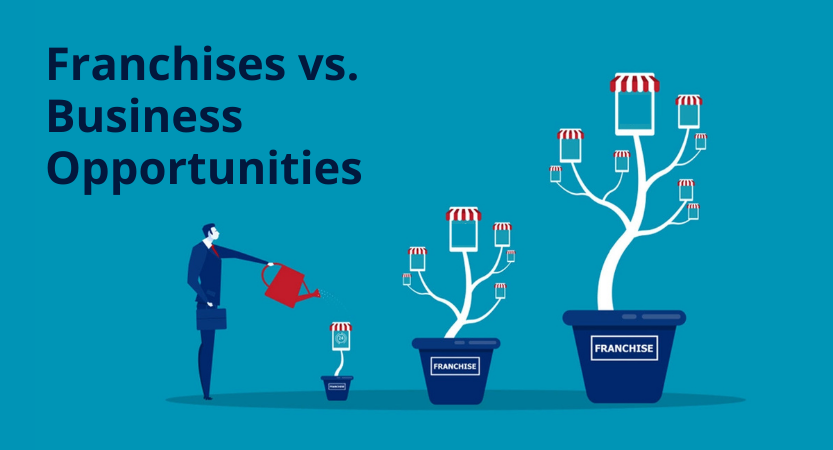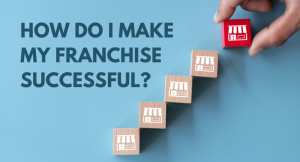Franchises and business opportunities (also known as biz opps) are two ways to establish a business without having to start from the ground up. While they are similar and share many characteristics, there are some variances to be aware of.
Choosing the correct type of entrepreneurial endeavor for your requirements and goals is a vital element of the research process that should come before making any other decisions.
Business Possibilities
A business opportunity is described as the sale or lease of any product, service, equipment, or other item that allows the buyer to start their own business.
Business prospects include a wide range of occupations.
Here are a few of the most well-known:
- Turnkey operations: Turnkey operations are a business concept in which a product or service is ready to sell or offer without the need for extra input from the buyer.
- Distributorships: Independent agents have the right to sell and market another company’s products to dealers, but they cannot use that company’s name as part of their own.
- Dealers: Dealers are identical to distributorships, with the exception that they sell to customers and retailers.
- Network/multi-level marketing: A network/multi-level marketer sells products directly to customers while also recruiting others to join the business. The agent is usually given a commission on their own sales as well as the sales of the agents they have recruited into the scheme.
- Trademark/product licenses: A corporation grants a licensee the right to use the seller’s trade name, as well as the seller’s procedures, products, equipment, and/or technology.
- Rack jobbers: a corporation sells its goods through retail racks that are serviced by an agent. The corporation is in charge of the racks, while the agent is in charge of the goods and how it is displayed. The agent will tell the company of what has been sold on a regular basis, and the company will send a commission check.
- Vending machine routes: Vending machine routes are similar to rack jobbers, except that the agent (in this case, the vendor) is responsible for both the machine and the merchandise. The agent is also responsible for maintaining the machines.
- Work from home opportunities: Opportunities to work from home: a corporation hires an agent to work from home, most typically through computer. Taking surveys from home, selling items on eBay, data entry employment, affiliate marketing, and many more options are available.
Traditionally, when a buyer buys a business opportunity, he or she owns the company fully and has complete control over many elements of it.
When a prospective business owner contacts a person (or entity) selling a business opportunity, they are contracting with that licenser for a business system, which may include training, equipment, or a service method that the license has gone through the growing pains with and has proven profitable. The relationship is normally over once the purchase is made and training—if applicable—is completed.
Franchises
A franchise is described as a company’s (franchisor) right or license to advertise its products or services in a certain territory to an individual or group (franchisee).
Franchises are divided into three categories:
- Business format: The most common type of franchising is the business format. The franchisor licenses its brand to a franchisee for use in conjunction with a predetermined business model.
- Product: The franchisor authorizes the franchisee to sell or distribute a product with their logo, trademark, or trade name.
- Manufacturing: The franchisor grants the franchisee the authority to manufacture and sell their items (such as food) under their own name and brand.
In order to finalize a franchise transaction, the potential franchisee must go through a considerably more comprehensive verification procedure.
A potential franchisee must first complete an application that details his or her background and work experience in order to determine how well he or she would fit into the franchise’s system, as well as provide detailed financial information to determine if he or she can sustain the business until it becomes profitable, if necessary.
The franchisor will next submit a franchise contract, which should be reviewed with legal assistance before being agreed to, presuming the possible franchisee is regarded as a good candidate.
The franchisor is also required to give a number of upfront disclosures. The Federal Trade Commission (FTC) requires franchisors to provide a Franchise Disclosure Document (FDD) to potential franchisees at least 14 days before a contract is signed. A franchise disclosure document (FDD) contains information about the company’s history, all of the franchisees in the system, turnover rates, terminations, fees, rules, and restrictions, as well as a variety of other topics.
Unlike a business opportunity, once a franchise is purchased, the franchisee is obligated to follow certain restrictions and rules about the functioning of the business. These rules are in place to safeguard other people in the system and to keep the brand consistent. Moreover, unlike most business possibilities, the franchisor’s costs do not end with the initial sale.
The royalty charge is the most typical recurring fee for franchises. Royalty payments are typically collected throughout the duration of the franchisee’s ownership. The franchisee will receive ongoing support, such as marketing and technical assistance, in exchange for these fees.
Risks of Both
Because business possibilities aren’t as tightly regulated as franchises, the entrepreneur must take extra care to prevent becoming a victim of a scam.
To counteract the dangers of scams, the Federal Trade Commission has taken steps to aggressively prosecute companies that have made fraudulent claims in recent years. They’re also aiming to educate anyone looking into these business opportunities, with a website that includes information on how to recognise a potential scam and how to contact them if you think you’ve been duped by a company promoting false business chances.
Also, just because franchises are subject to more government regulation than other types of businesses does not mean they are risk-free. There are various dangers associated with owning a franchise. For example, hidden costs for equipment or materials required to run the business that aren’t defined or made obvious in the FDD can add up.
Comparison Chart
| Business Opportunity | Franchise | |
| Costs | Few require royalty payments, making them less expensive than a franchise. | With compulsory royalty payments to the franchisor, there are higher upfront expenditures. Most potential franchisees will require funding to cover the upfront fees, which can be fairly high |
| Structure | Less organized operations allow owners to apply the systems that work best for them while also allowing for easier business customisation. | Very regimented, with little to no wiggle room in terms of departing from the established business strategy. This includes things like standard operating procedures and quality assurance. |
| Ongoing Support | After the business is set up, the seller and purchaser of the business opportunity usually have little communication. Any assistance is usually unstructured and not based on a contract. | As part of their franchise agreement, franchisors usually supply training, marketing support, and other products to franchisees. |
| Legal Regulation | State-by-state differences exist. The licensee is usually required to give the purchaser some type of disclosure. | Before any agreement is signed or concluded, the franchisor must present an FDD to the franchisee. |
Picking the Right One for You
To summarize, all franchisees are business opportunities, but not all franchises are business opportunities.
Both of these methods for making a business investment are appropriate for those who do not have a distinctive product or service to offer the market but nonetheless wish to manage a company. The most important distinction between the two is how much assistance you require.
A business opportunity is definitely the best way for you if you’re only searching for a restart and want more flexibility. A franchise may be the right choice for you if you want constant support and can tolerate (or prefer) greater restrictions (or direction) in your business practices.
Regardless of which path you choose, here are some pointers to help you get started:
- For further information on the company, contact the state attorney general’s office.
- Find and speak with current and previous business owners who have gone through the process of starting the business you want to establish.
- To help lessen the strain, enlist the help of experts such as a lawyer, accountant, and realtor (for zoning considerations).
- Before signing anything, make sure you read all of the documents thoroughly.
Without a solid business plan and a lot of hard work, any business effort will fail. For these reasons, do your homework, ask a lot of questions, especially about net earnings, keep your expectations in check, and work hard to make your business a success.




